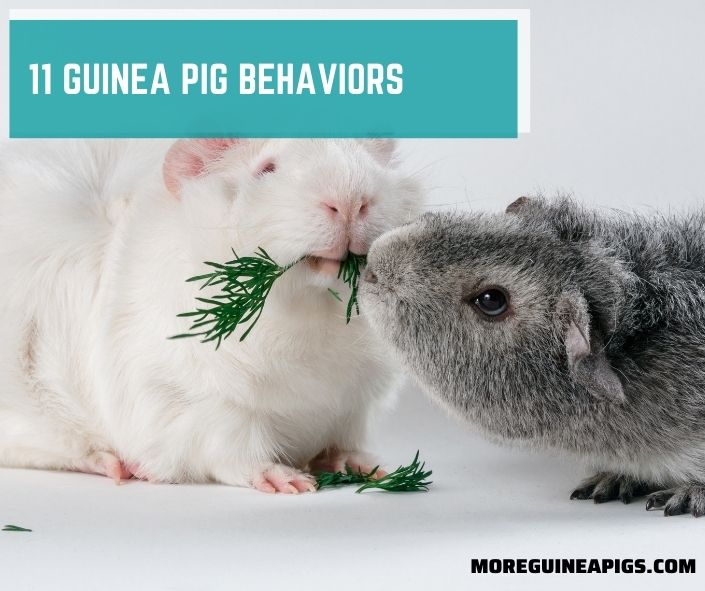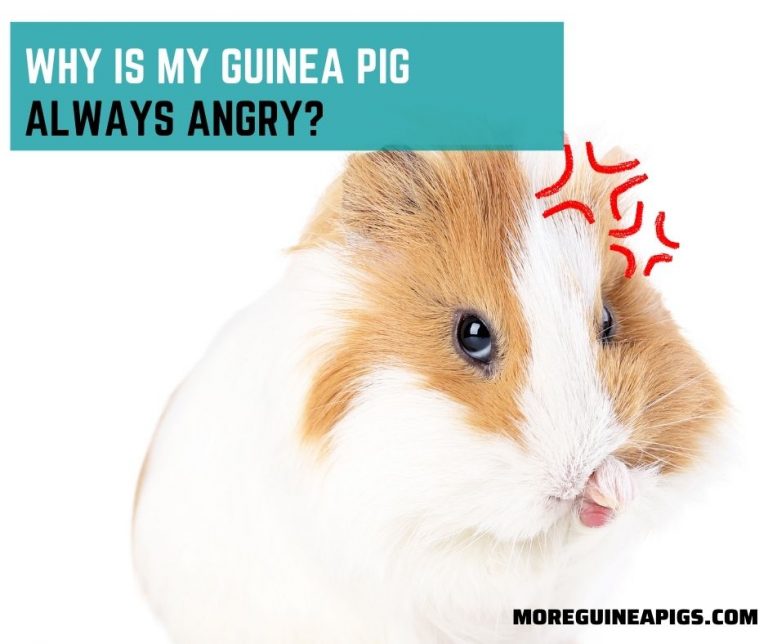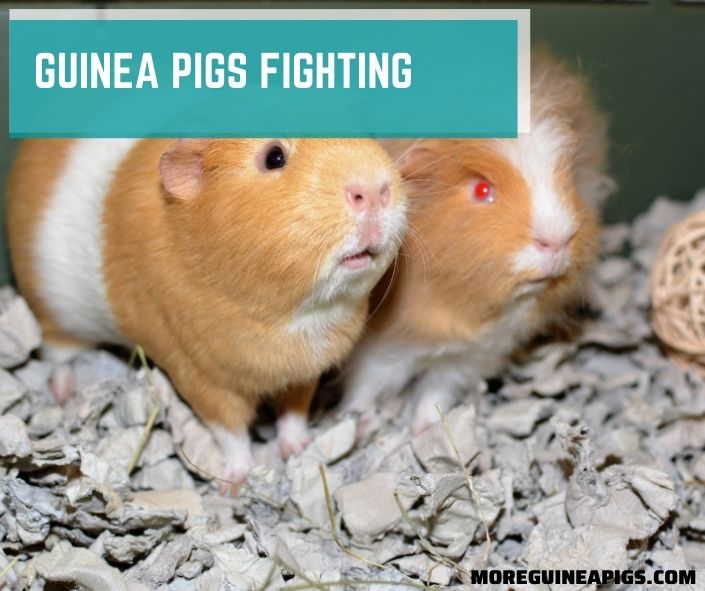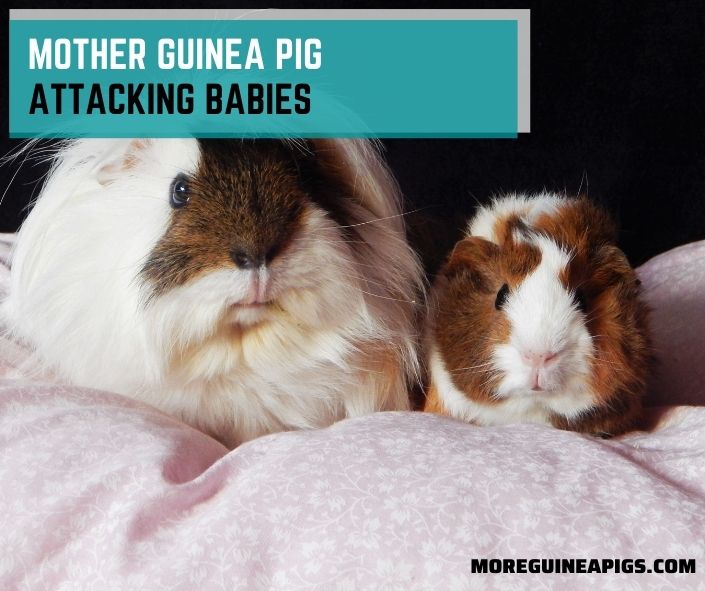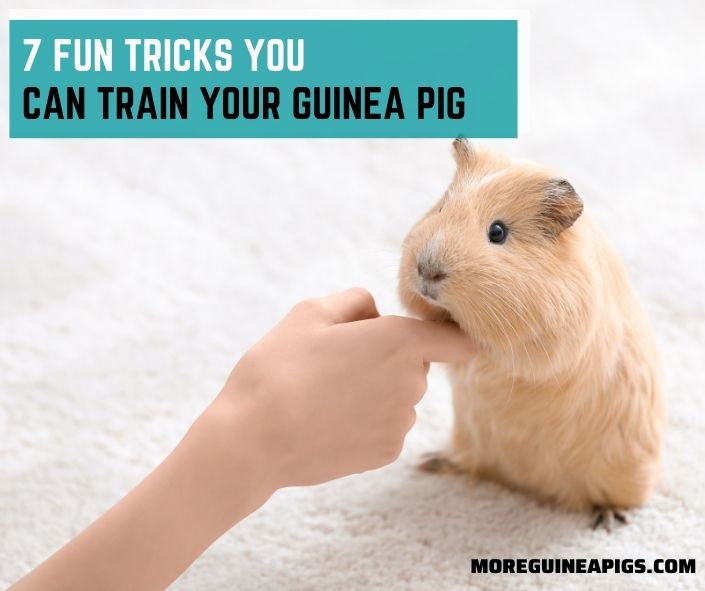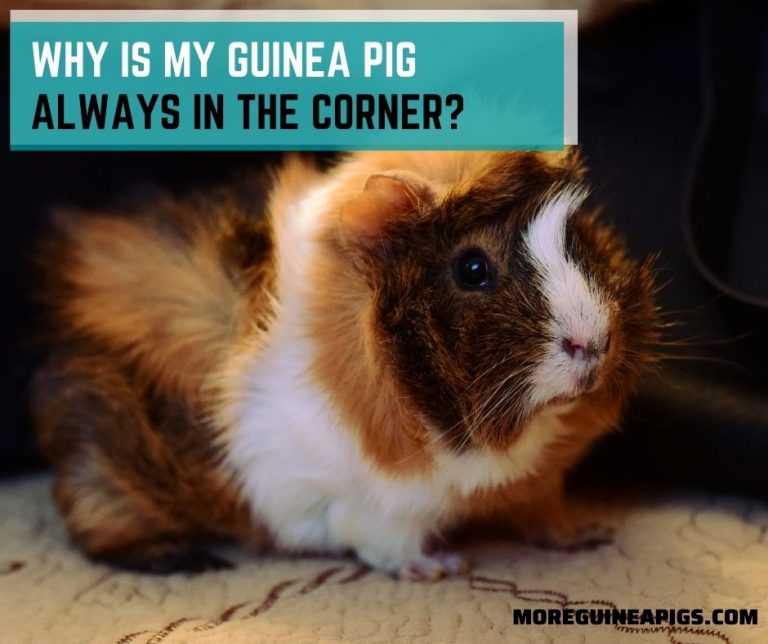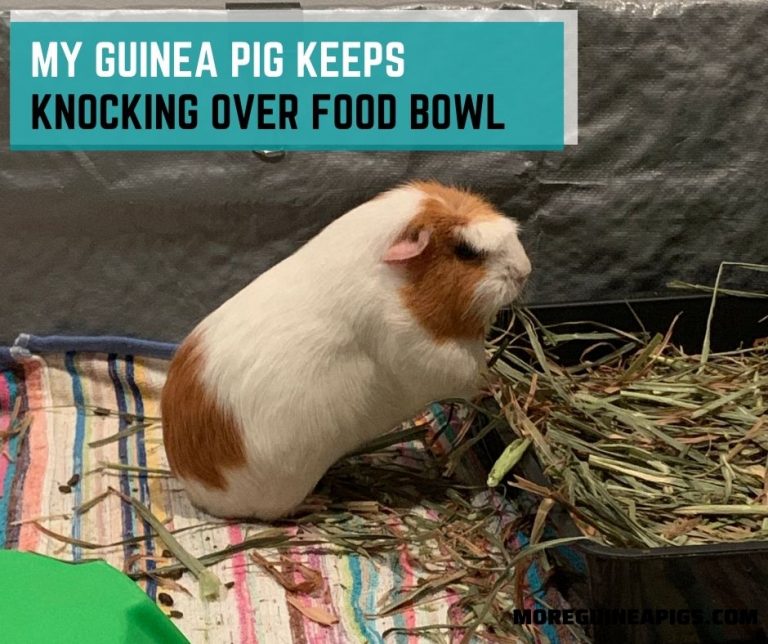11 Guinea Pig Behaviors To Help You Understand More About Them
Guinea pigs may come across as simple creatures, but don’t let their size fool you. In reality, cavies are intelligent and inquisitive pets with unique personalities and a specific set of needs.
If you take the time to understand their behaviors and habits, you’ll be well on your way to becoming a stellar guinea pig parent and forming a strong bond with your piggies.
By the end of this article, you’ll be familiar with the most common guinea pig behaviors including how they communicate and interact with you and other piggies, their activity habits, signs of happiness and stress, and more.
11 Guinea Pig Behaviors To Help You Understand More About Them
It’s important to recognize common guinea pig behaviors to better understand their needs. In general, cavies are gentle, sweet, and very active.
They’re also social creatures, making them vocal communicators who love physical interaction with other guinea pigs and their owners.
Here are the most well-known ways a guinea pig will communicate and what their signals could mean.
Often Communicate Vocally
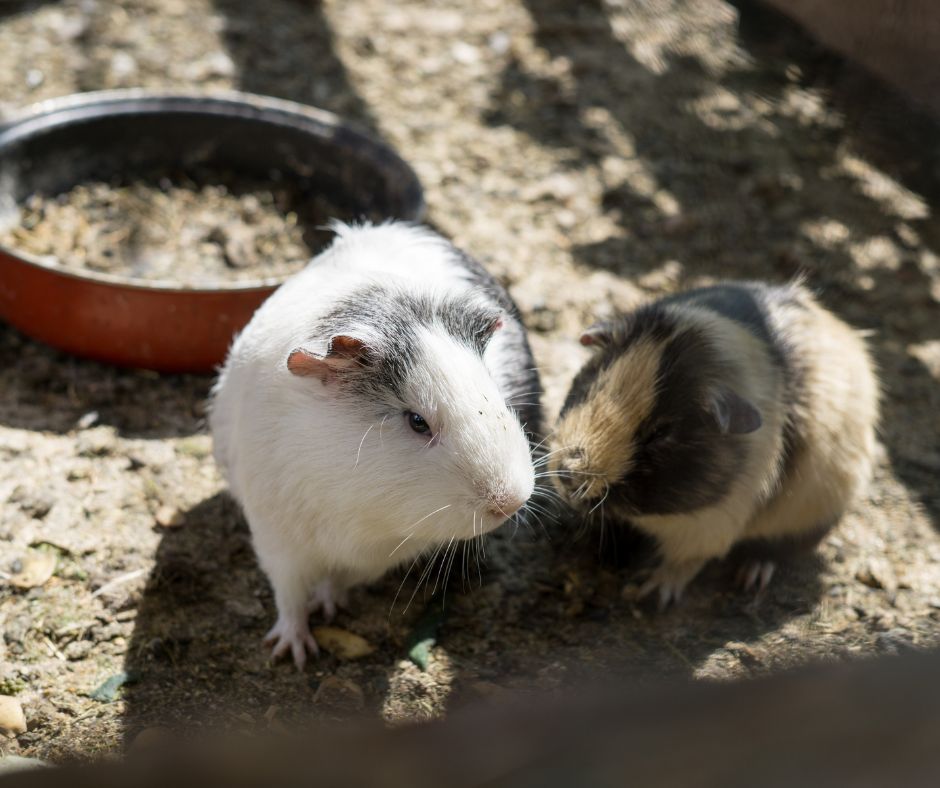
Although guinea pigs aren’t inherently noisy animals, they can come off as chatty compared to other small pets like hamsters.
They’ll use vocalizations to communicate with each other and their owners, so don’t be surprised when they acknowledge your presence with a little squeak.
These are some of the most common sounds a guinea pig will make and what they could be trying to tell you:
- Wheeking (Squealing): This familiar guinea pig noise sounds like a long squeal combined with a whistle. It means that they’re excited or anticipate something exciting that is about to happen. You may notice it most near mealtime or when you come home from a long day at work.
- Chutting: Produced by a series of quick staccato sounds, this noise indicates that your guinea pig is content. They’ll most likely make this noise after a meal, when they’re exploring a calm environment, or feeling safe in your arms.
- Chirping: Some guinea pigs can make small chirping sounds like a bird. Nobody knows for sure why they make these sounds, but most of the time, it happens after a guinea pig has lost a partner.
- Purring: Did you know that guinea pigs can purr like a cat? In most cases, a low purr means that your guinea pig is relaxed and content. However, if the tone is higher and your piggie’s body language is stiff, it could mean that it is stressed and annoyed.
- Teeth Chattering: If your guinea pig starts chattering its teeth, it may be time to back away. This indicates that it’s feeling angry and aggressive, and if agitated any further, may retaliate with a bite.
- Hissing: This is another sign that your guinea pig is agitated. If your piggie hisses at your or another guinea pig, it may need some space and to be left alone for a while.
- Shrieking: This sound is hard to miss and indicates that the guinea pig is either scared or injured. Either way, you should pay attention to them immediately.
- Whining: If your guinea pig is whining, it’s likely either annoyed with something in the environment or not feeling well. It’s best to get them checked to ensure they’re not in pain.
“Popcorning” To Exhibit Happiness
First-time guinea pig owners may be surprised when their guinea pig suddenly starts bucking and squealing, but this behavior is quite normal. In fact, it means they’re happy and literally leaping with joy.
A healthy and excited guinea pig will occasionally leap in the air like a popcorn kernel that just popped, earning it the name “popcorning.”
It’s mostly displayed by younger guinea pigs and is known to be one of a cavy’s most adorable behaviors.
Enjoy Interaction With Owners
Cavies are social by nature and show great affection towards the humans they bond with. If your guinea pig loves you, they’ll show how much they care through loving behaviors such as:
- Nuzzling
- Purring
- Licking
- Kissing
If you seek to develop a strong connection with your piggies, there are several easy ways to do so. Just remember to stay patient and consistent.
A guinea pig’s trust needs to be earned, but once you have it, you can look forward to sharing a wonderful lifelong bond with your furry friend.
Here are some of the best ways to get your new guinea pig to trust you:
- Give them time: When you first bring them home, it’s best to avoid picking them up straight away. This can make them associate you with fear and anxiety. Instead, spend the first week or so simply being present and softly speaking to them through the cage.
- Spend time with them: If you want to form a friendship with your piggies, you’ll have to get to know them first. Spend at least one hour per day sitting with them, speaking to them, and playing with them.
- Speak to them often: Did you know that guinea pigs can distinguish your voice from others? This is why talking to them is such an important part of the bonding process. Gently speak with them every day, and over time, your piggie may begin to squeak with excitement when they hear you.
- Hand-feed vegetables and treats: Giving healthy vegetables and treats to your guinea pigs is a great way to help them associate your presence with something positive, but don’t be too brash with this trick. It may be a little frightening for them to take food from you at first, so be patient or try this trick after they feel more comfortable with you.
Like To Interact With Other Friendly Guinea Pigs
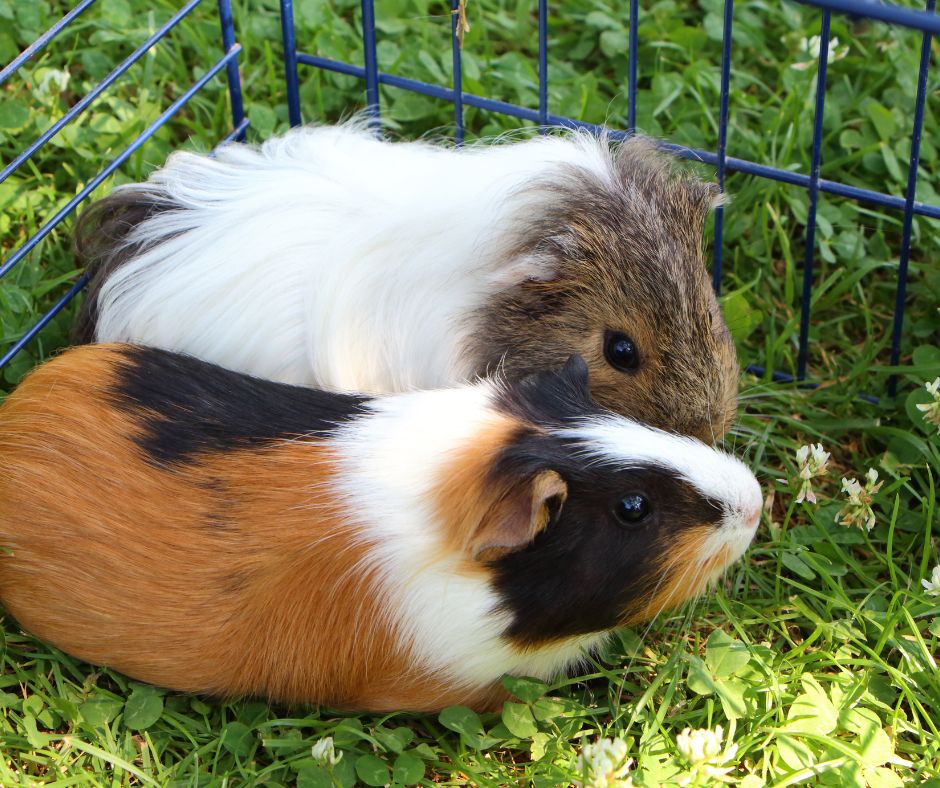
In the wild, cavies live in herds of approximately ten or more. They rely on each other to fulfill their social needs, so it’s recommended that guinea pigs be adopted in groups of at least two.
Many studies prove a lack of social structure can be detrimental to a cavy’s overall health.
Bonded guinea pigs will happily groom each other, share food, cuddle, and play. Some will even display signs of depression if their partner is lost.
If you are thinking about adopting a guinea pig, consider bringing home a pair. This will ensure your piggies always have a buddy, and two guinea pigs are always better than one!
If you are introducing two piggies, you’ll want to take the process slow and steady to prevent any confrontations. If possible, try housing them with a mesh in the middle so they can communicate and get used to each other’s scents.
When it’s time to bring them together, sit nearby to monitor their behavior. It’s not common for them to display aggression, but if they do, keep a solid board handy so you can quickly separate them.
Some cavies bond immediately while others will take more time. Stay vigilant and conduct several introductions until you’re confident that they can be together without supervision.
Extremely Active
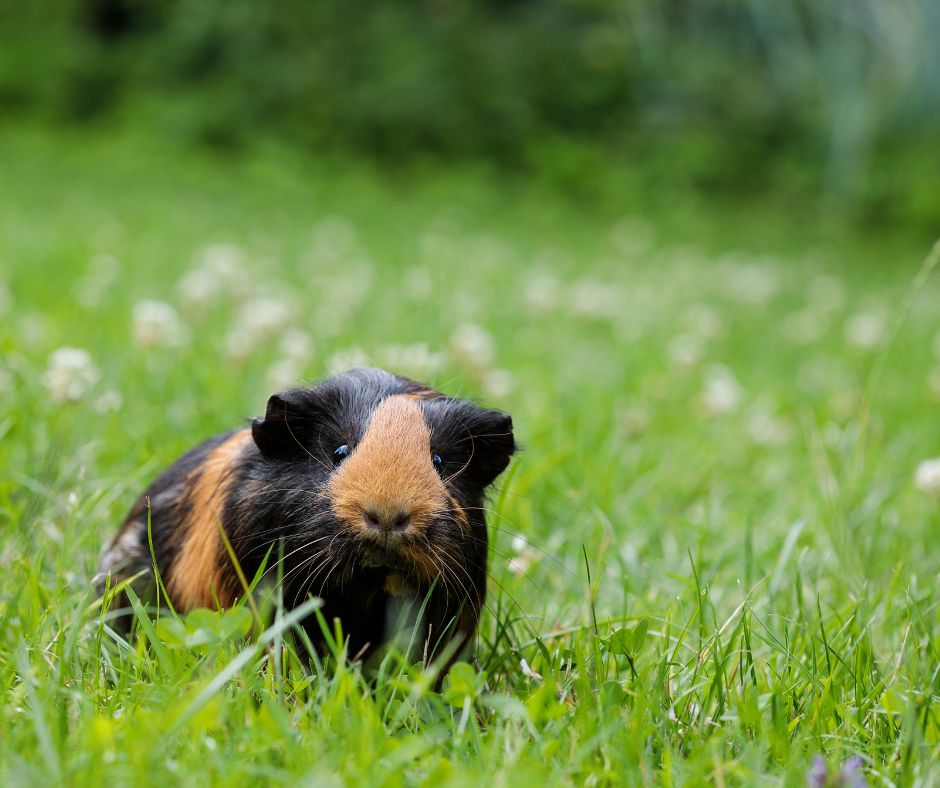
Unlike many of their rodent cousins, guinea pigs are active both day and night and require plenty of exercise to stay happy and healthy.
Luckily, there are many ways to provide physical activity for your guinea pigs. Make sure you allow at least three hours of playtime each day to ensure they don’t become bored or depressed.
Constant Access To Hiding Places
As prey animals, guinea pigs are driven to seek shelter as soon as they feel scared, stressed, or unwell. It’s important to provide them with a quiet place to hide.
When setting up your guinea pigs’ play space, place enough shelters so every piggie will have its own hiding area. Some examples for suitable hideouts include:
- Store-bought shelters
- Cardboard boxes
- Custom-made igloos
- Tunnels
Only you will be able to identify if your guinea pigs feel secure in the shelters you provide. If they don’t take to one of the items on this list, try another until they feel safe and relaxed during their alone time.
Guinea Pigs Like To Tunnel
Wild cavies dig tunnels for nesting, sleeping, and hiding from predators. To satisfy this basic need, you’ll have to provide your piggies with a tunnel for exercise and hiding purposes.
Tunnels can be purchased from most pet stores or created at home, and they can either be installed into your pigs’ cage or placed in their designated play area.
If you want to add extra mental stimulation for your piggies, try hiding treats in the middle of the tube or stuffing it with hay. This will provide a fun challenge for your piggies and an opportunity to enjoy a delicious snack.
Flexible Wood Hideout – Extra Large
Need Something To Chew And Play
A guinea pig’s teeth will grow continuously throughout its life. Without something to consistently chew on, their teeth will grow too long and eating may become difficult for them.
Make sure your cavy has access to good-quality products like hay sticks, chew toys, grass mats, and munchable treats.
Many veterinarians have confirmed you can also give common household items like a paper towel roll or cardboard box for your piggie to chew on.
Groom Themselves By Licking
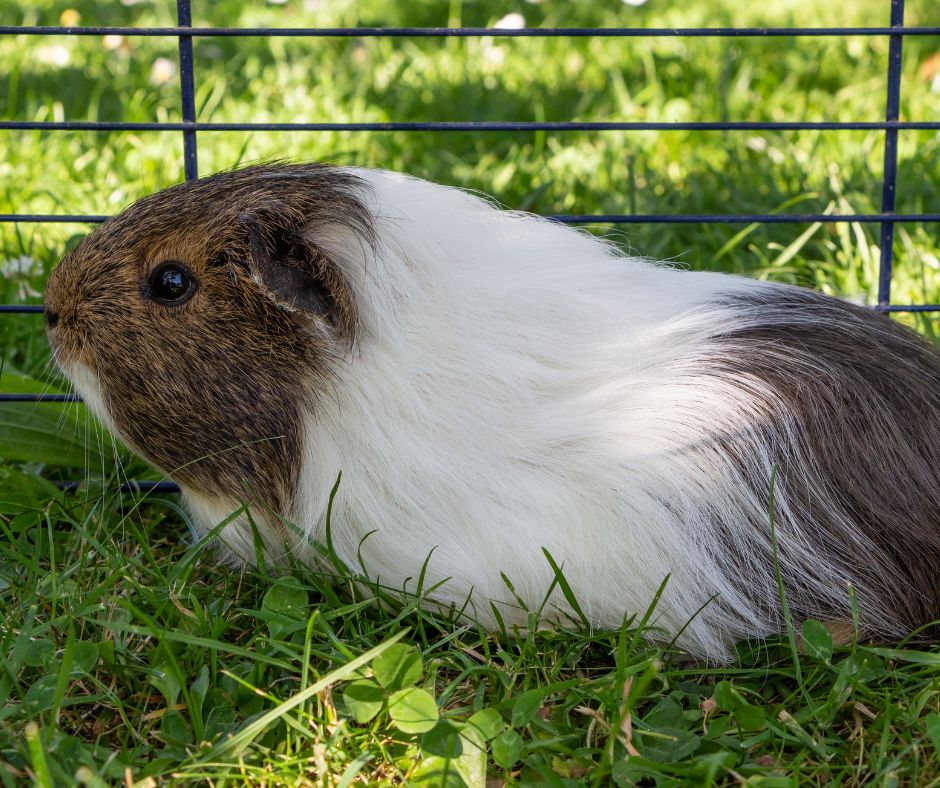
Guinea pigs do a fair amount of licking themselves, but it’s how they keep themselves clean.
When it’s bathtime, a guinea pig will usually begin by standing on its hind legs for better access to its front and back sides. Then it will lick or nibble on any dirty spots it finds and finish by licking their paws and wiping their faces.
It’s also common for guinea pigs to groom one another. If you notice your piggies are licking each other often, this is a sign that they are content and enjoying each other’s company.
Stand Up On Its Hind Legs To Beg For Food
Dogs aren’t the only pets that will beg for food. When your guinea pig is hungry, it may ask for a snack by standing on its hind legs.
More reasons a guinea pig will stand up are to better understand an interesting smell or get a better view of its surroundings.
Guinea Pigs Pee A Lot
Cavies eat and drink consistently throughout the day, so they will relieve themselves very frequently. In fact, a healthy piggie will pee approximately every 15 minutes or up to four times an hour.
A guinea pig usually urinates in the same spot within its habitat, but it’s not uncommon for them to tinkle wherever they are. If you’re worried about your piggie’s peeing on undesirable spots in your home, try placing puppy pads in their play area.
It’s also possible to train your guinea pig to use a litter box if you’re willing to put in the effort and patience.
Guinea Pigs Poop A Lot
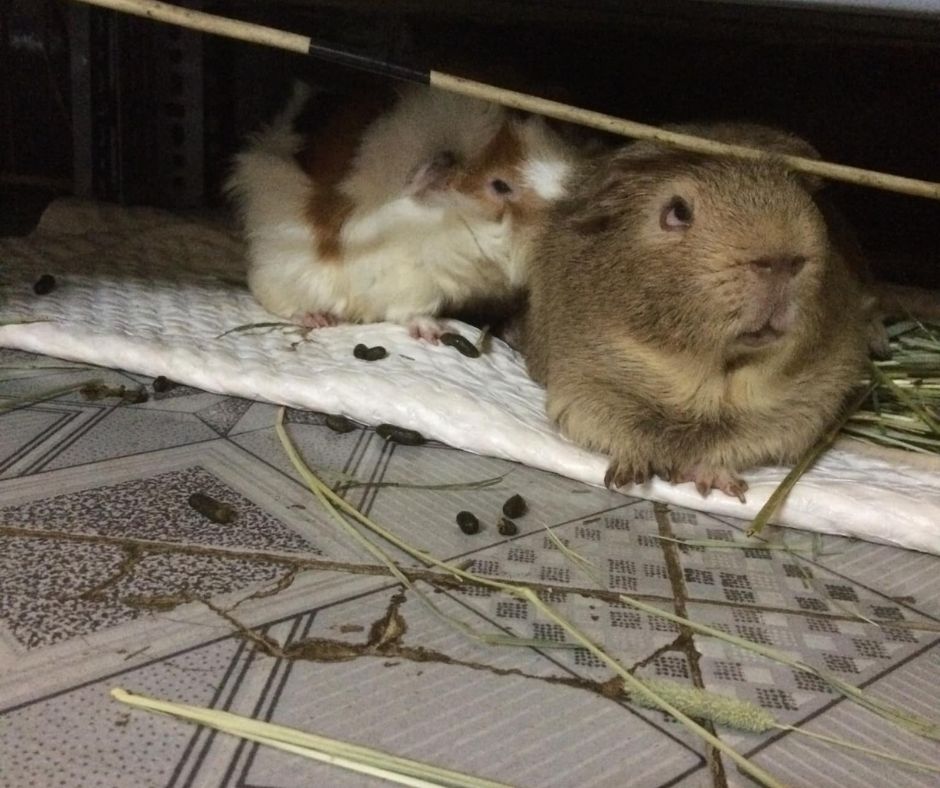
A guinea pig’s body is configured to quickly digest food and expel it. The average cavy will poop anywhere between 100-150 times a day.
While they usually have a favored spot to pee, this does not apply when it comes to poop. They’ll excrete just about anywhere and anytime they please, and there’s very little you can do to prevent this.
However, if you’d like to minimize how often your piggie poops without affecting its overall health, you can try adding more fresh vegetables to their diet or training them to use the litter box.
Eating Its Own Droppings
This is usually a less than desirable topic, but it’s one of the realities of owning a guinea pig.
It’s very common for a guinea pig to eat its own droppings, and it’s even a healthy habit for them. As members of the coprophages family, cavies have a nutrient deficiency that’s easily remedied by consuming their poop.
Plant matter is not completely broken down the first time it moves through the cavy’s body, so it will ingest the droppings to maximize on those nutrients and other essential vitamins.
A Rare Behavioural Pattern Is Bite
Guinea pigs are inherently gentle and loving, but if given a reason, these amiable pets will defend themselves by biting.
The most common reason a guinea pig will bite is that it feels threatened, scared, or bullied.
Those who haven’t formed a bond with their guinea pig yet may also find themselves being bitten if they handle their piggie the wrong way or stick their hand into the enclosure to grab something.
To avoid a guinea pig bite, pay attention to your guinea pigs’ body language and give them space if they seem afraid or annoyed.
Signs Of A Happy Guinea Pig
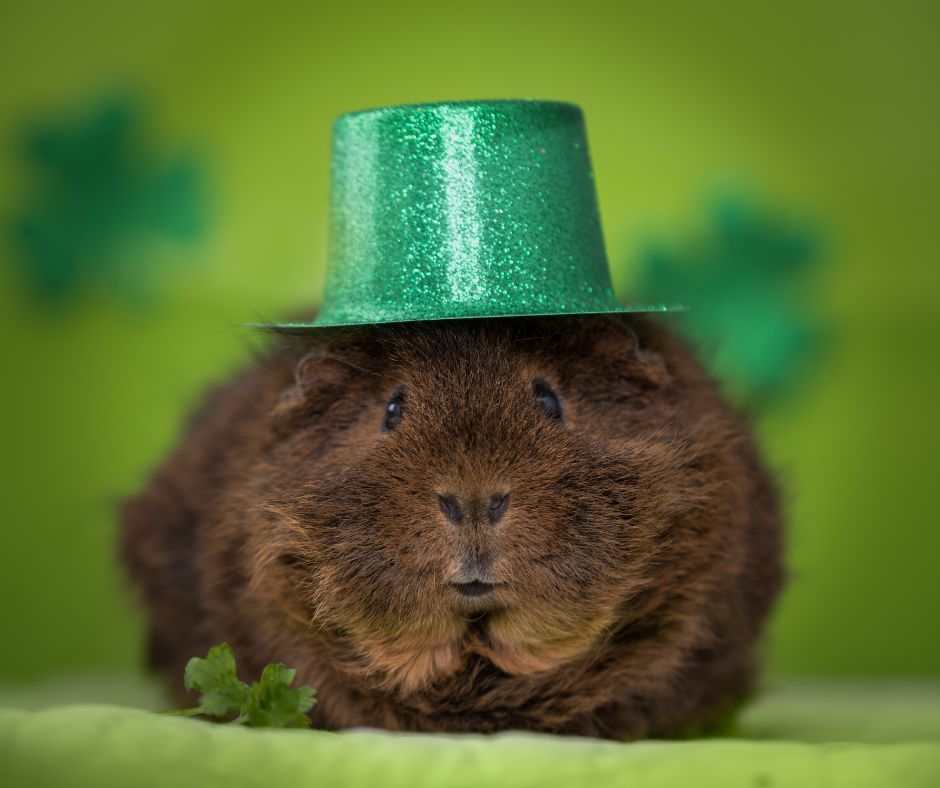
Piggies bring plenty of joy and laughter to their owners, but how do we know if they’re happy with us?
Here are just some of the behaviors your guinea pig will display to show their contentment:
- Happy sounds: If your guinea pig is wheeking, purring, or chutting, they’re letting you know that they’re feeling cheerful.
- Popcorning: When your piggie suddenly becomes a bucking bronco, they’re displaying their happiness through a behavior called popcorning. They’re leaping with joy!
- Healthy appetite: Cavies are eating machines, so if your guinea pig is eating well and snacking often, it’s a good sign of happiness.
- Sleeping in the open: Guinea pigs usually prefer to sleep in covered places, but if they’re resting out in the open or your lap, it means they feel safe and content.
- Greetings: If your guinea pig squeals with delight when you come home and approaches you when you enter the room, it is one of the ultimate acts of trust and happiness.
Toys for Rabbit Bunny Chinchilla Guinea Pig
Signs Of Stress And Fear In Guinea Pigs
Like most pets, guinea pigs can become stressed and afraid for a variety of reasons. It’s our job as piggie parents to recognize the signs of stress and correct the problem before health issues arise.
Here are the signals you’ll want to pay attention to:
- Excessive hiding: It’s natural for guinea pigs to spend alone time in their space every once in a while, but if they’re hiding more than usual, something could be wrong.
- Poor appetite: Guinea pigs must eat constantly to satisfy their nutritional needs. If your piggie has suddenly stopped eating, you should seek medical attention immediately.
- Hair loss: Our precious piggies are prone to an assortment of skin infections that cause hair loss, but it could also indicate your pet is feeling stressed.
- Teeth baring and hissing: Guinea pigs may become aggressive when attempting to defend themselves. When this happens, try giving them some space and returning later.
- Bar Chewing: Is your guinea pig constantly chewing on the bars of its cage? This could indicate that your piggie is stressed from boredom and wants to spend more time with you.
In Conclusion
Understanding your guinea pig’s behavior is a great way to build a closer relationship with your pet. They’re active, funny, smart, and above all, affectionate companions that have so much to offer.
If you’re willing to commit to a cavy, you can look forward to many years of irreplaceable friendship with one of the world’s most fascinating creatures.
